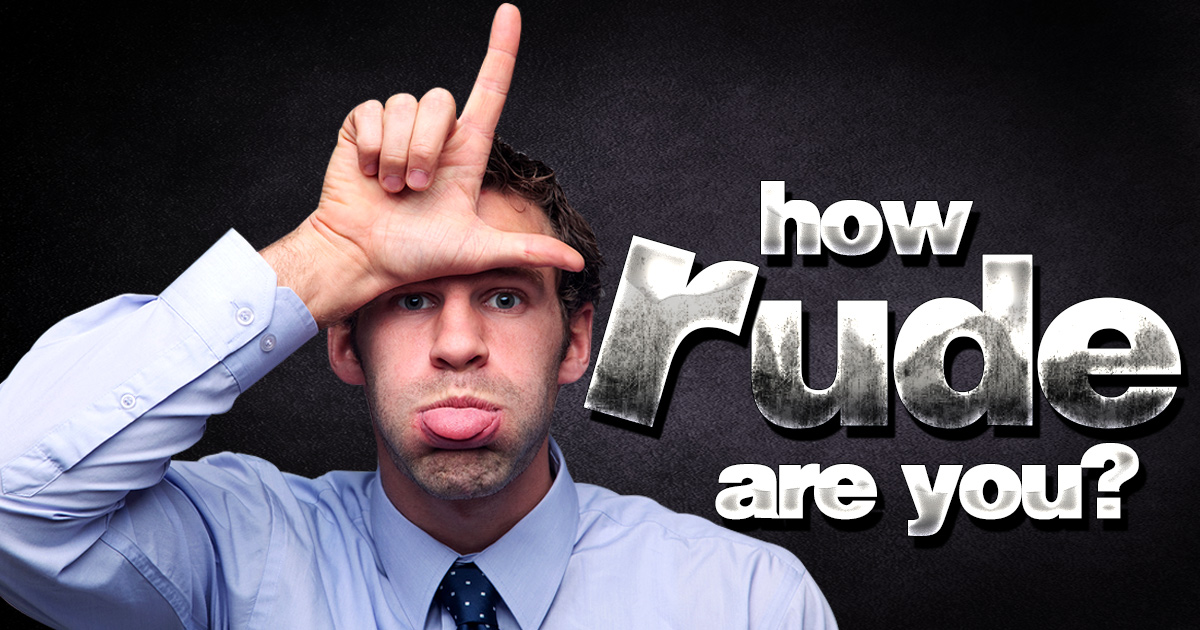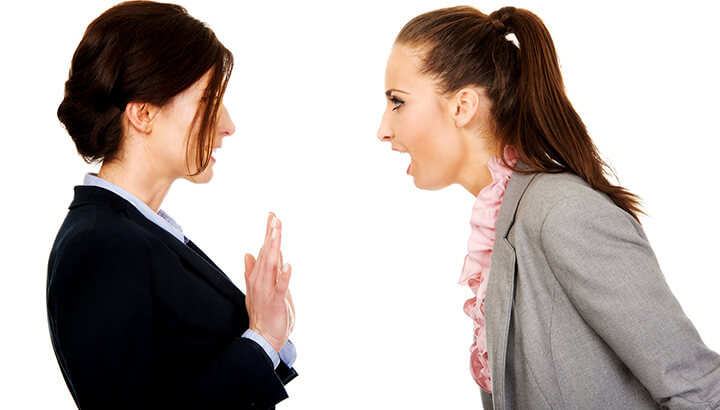That Was Rude That Was Pretty Fucking Rude - Unpacking Impoliteness
There are moments in life, you know, when someone does something or says something, and it just hits you. It's that feeling, a sudden jolt, where you might think to yourself, or perhaps even say it out loud, "that was rude that was pretty fucking rude." It's a phrase that captures a real sense of surprise and, well, a little bit of offense when someone acts without much thought for others, or just behaves in a way that feels quite out of line. It’s a very human reaction to an interaction that just doesn't sit right.
These kinds of interactions, they stick with us, don't they? Whether it’s a quick remark that lands flat, or a more drawn-out display of behavior that shows a lack of care, the impact can linger. We all, in a way, have a general idea of what good behavior looks like, and when someone steps outside those unspoken rules, it can be quite jarring. So, when we encounter these instances, that phrase, "that was rude that was pretty fucking rude," really seems to capture the raw, immediate feeling of it all.
This discussion will try to get to the bottom of what we mean when we use such strong words for impolite actions. We will, in some respects, look at the different ways this kind of behavior shows up, and why it can feel so impactful. We'll also consider how our common language helps us express these moments of being taken aback, and what makes certain actions just plain unthoughtful or even truly offensive to people.
Table of Contents
- What Does "Rude" Really Mean?
- Beyond Just Bad Manners- "that was rude that was pretty fucking rude"
- How Do We Spot Something "Rude"?
- The Many Faces of "that was rude that was pretty fucking rude"
- Is There a History to "Rude" Behavior?
- When "that was rude that was pretty fucking rude" Was Something Else Entirely
- Why Do Certain Actions Feel So "Rude"?
- The Impact of "that was rude that was pretty fucking rude"
What Does "Rude" Really Mean?
When we talk about something being "rude," our minds typically go straight to someone acting without good manners or saying something that causes offense. However, the word itself has a rather interesting past, you know, a history that shows it once meant something quite different. Originally, the idea of "rude" could point to something being in a rough or unfinished state. Imagine a piece of wood that hasn't been smoothed down yet, or a very first drawing, just a basic outline. That, in a way, was considered "rude" in an older sense of the word. It was about something being in its raw form, not polished or refined at all. So, too it's almost, the meaning has really shifted over time, moving from something about a lack of finish to a lack of polite behavior. This change in meaning, it’s quite something to think about, isn't it? It shows how words can evolve, taking on entirely new shades of meaning as people use them in different ways across the years.
Beyond Just Bad Manners- "that was rude that was pretty fucking rude"
While the old meaning of "rude" described something unrefined, the way we use it today points to actions or words that just aren't appropriate, and often, they're not very nice either. For instance, yelling something like "you stink!" at a children's talent show would absolutely be a moment where someone might feel, "that was rude that was pretty fucking rude." It's a type of behavior that goes against what most people consider acceptable in a social setting. It's about a lack of consideration for others' feelings, a sort of disregard for the comfort of people around you. This isn't just about simple clumsiness; it's about a deliberate or even thoughtless act that can make others feel uncomfortable or even insulted. The dictionary, for example, often describes "rude" as words and actions that are likely to cause embarrassment or upset people, particularly when they touch on topics like private body functions or matters of a personal nature. So, it's not just about being impolite; it often carries a stronger sense of being truly offensive to someone.
How Do We Spot Something "Rude"?
Figuring out what counts as "rude" behavior often comes down to how someone acts or speaks without really thinking about the people around them. It's behavior or language that just doesn't show consideration for others, feeling impolite, or even disrespectful. You know, it's often linked with what we call "bad manners," or perhaps a kind of bold disregard for social customs, or even being offensively nosy. For example, if someone were to interrupt a conversation constantly, or perhaps speak over others without letting them finish their thoughts, that could very well be seen as a display of rudeness. It's about how actions affect the comfort and feelings of those sharing a space or interaction. We pick up on these things, really, through the way we feel when someone behaves in a certain manner, or through the reaction of others in the room. It’s a bit like a social antennae, picking up on signals that suggest a lack of proper regard for others' presence or feelings.
The Many Faces of "that was rude that was pretty fucking rude"
The ways in which behavior can be considered "rude" are quite varied, actually. Sometimes, it's simply about not having good social graces, like when someone doesn't say "please" or "thank you." Other times, it can be more pointed, like when someone makes a harsh comment about another person's appearance or choices. There are, in some respects, many different ways to express this lack of consideration. Some common words that mean something similar to "rude" include "crude," "raw," and "rough." While all these words suggest a lack of social polish, "rude" often implies a kind of unawareness of, or even a complete lack of interest in, what's considered proper behavior. It can be about being discourteous or impolite, especially when it seems like someone is doing it on purpose. Think about a situation where someone might deliberately ignore you when you're speaking, or perhaps make a loud, inappropriate joke in a quiet setting. That, you know, can certainly make someone feel "that was rude that was pretty fucking rude." It's about a spectrum of actions, from simply being a little thoughtless to being outright offensive, and the context really does matter quite a bit.
Is There a History to "Rude" Behavior?
The concept of what is considered "rude" has, in a way, always been tied to the customs and expectations of a particular time and place. What might have been acceptable behavior centuries ago could be seen as completely out of line today, and vice versa. As a matter of fact, the very meaning of the word "rude" itself has, as we discussed, changed quite a bit over the years. We can see hints of this older meaning in some older writings. For example, there's a line that talks about "Our father Adam sat under the tree and scratched with a stick in the mould, And the first rude sketch that the world had seen was joy to his mighty heart, till the devil whispered." Here, "rude sketch" means a basic, unrefined drawing, not something impolite. This shows how the word once described things that were simple or not fully developed, rather than someone acting without manners. So, this historical perspective really does give us a broader picture of the word's journey and how it came to mean what it does for us today.
When "that was rude that was pretty fucking rude" Was Something Else Entirely
Considering the historical usage, it's pretty clear that the phrase "that was rude that was pretty fucking rude" wouldn't have made sense in the same way centuries ago, if at all. The shift in the word's meaning from "unfinished" or "rough" to "impolite" or "offensive" is, in some respects, a reflection of how societies have changed their focus on social conduct. In earlier times, the emphasis might have been more on the practical state of things, like a "rude" tool meaning a simple, basic one. But as communities became more complex, and interactions between people grew more nuanced, the idea of what constitutes proper behavior became more important. This led to the word "rude" being applied to actions that lacked consideration for others, rather than a lack of polish in an object. So, you know, when we use the phrase today, we're tapping into a very modern understanding of social rules and the impact of someone's actions on another person's feelings. It highlights how our language evolves to reflect the things we care about in our daily lives, like how people treat each other.
Why Do Certain Actions Feel So "Rude"?
Certain actions just strike us as "rude" because they go against our basic expectations of how people should interact. It’s often about a lack of consideration for another person's feelings or boundaries. When someone is impolite, or perhaps disrespectful, it can make us feel devalued or even attacked. Think about it: if someone yells "you stink!" at a children's talent show, as we mentioned earlier, it's not just a loud noise; it's a direct, unthoughtful comment aimed at making someone feel bad. This kind of behavior, which is often linked with bad manners or being offensively nosy, can really disrupt the peace and comfort of a situation. It's not just about breaking a rule; it's about the emotional effect it has on the person on the receiving end. So, really, the impact is what makes it feel so jarring and why we might react so strongly to it.
The Impact of "that was rude that was pretty fucking rude"
The words we use to describe impolite behavior, like "that was rude that was pretty fucking rude," carry a lot of emotional weight because the actions they describe can truly affect people. When someone acts without consideration, it can make others feel uncomfortable, embarrassed, or even angry. For instance, if someone is constantly interrupting or speaking over you, it's not just annoying; it can make you feel unheard and disrespected. Or, if someone makes a joke that's inappropriate for the setting, it can create an awkward atmosphere for everyone involved. These behaviors can be quite disruptive to social harmony. It’s about the feeling of being disregarded or having one's personal space or feelings invaded. The phrase itself, with its strong language, serves as a way to express that immediate, visceral reaction to a moment when someone crosses a line. It’s a very human way of saying, "that just wasn't okay," and it shows how much we value mutual respect and thoughtfulness in our everyday interactions. It's a signal that something truly felt out of place and caused a genuine negative reaction in the moment.
To summarize, we've explored how the word "rude" has changed meanings over time, from describing something unfinished to describing impolite actions. We looked at how we identify rude behavior, often by its lack of consideration for others, and how various actions, from simple bad manners to truly offensive comments, can fit this description. We also considered the historical journey of the word and why certain actions feel so impactful, often causing discomfort or offense because they disregard others' feelings.

How Rude Are You? | BrainFall

7 Things You Can Do When Someone Is Rude

The Serious Dangers of Being Rude | Be Well Philly